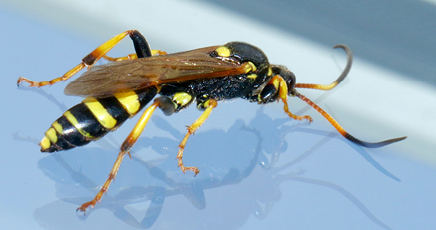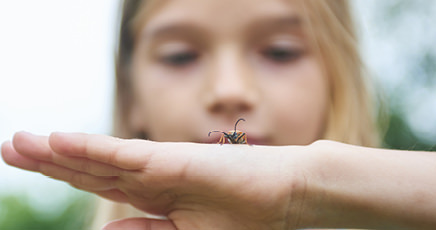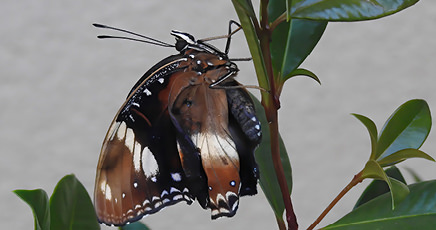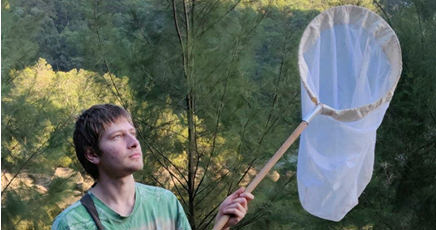LEARNING ACTIVITY
STORY
To learn more about invertebrates, Suyin and her grandfather decided to challenge each other. Every Sunday night, they would decide on a group of invertebrate to investigate. In their own backyards, they would keep their eyes open, make observations and keep a daily tally of how many they spot. Extra points were awarded if they witness their invertebrate doing something special, such as a bee drinking nectar or a cicada emerging from its shell. At the end of the week, they would compare their numbers and their observations. Extra extra bonus points if they have photos to share.
Suyin was confident that was going to beat her grandfather in the first week, she was able to catch Aphids eating the sap on the tips of the garden rosebuds. She hoped that some Hover fly larvae would come along to eat the aphids soon, she had planted out some Alyssum plants to attract Hover flies with her grandfather earlier in the year.

Biodiversity has been perfected by nature over millions of years where invertebrates have played an important role in maintaining a balanced, biodiverse ecosystem. Invertebrates provide services to food crops including pollination and protection from pests.
Learners will draw on their study of invertebrates from the assessment activity to help develop a hypothesis on increasing biodiversity by planting different flowering plants that attract invertebrates, specifically beneficial insects.
This learning activity is the second part of a sequence of 3 individual learning activities focused on creating a beneficial garden. The order of these activities are: assessment, investigation and planting.
For children to:
- understand the advantages of a biodiverse ecosystem
- recognise that insects can play a beneficial role in the garden
- collect and identify an insect
- undertake research about a beneficial insect and the role(s) it plays
- develop a hypothesis about how planting flowering plants affect the presence of insects.
In some climates, there will be a reduction in beneficial insects during the cooler months and this may affect the pollination and protection that beneficial insects provide. Keep this in mind when researching your beneficial insect, and use this information to help plan the type of food crop you are planning to grow in the planting activity of this sequence.
Introduction
The aim of this activity is for our young learners to make the connection between beneficial insects in the garden and their relationship to flowering plants. Invertebrates or bugs that provide services such as pollination or pest-predation are commonly known as beneficial insects. These insects can often be encouraged into a garden by planting flowering plants alongside food crops. This is known as beneficial gardening.
*Time allocation will be dependent on site selection and travel time.
Checklist
Instructions
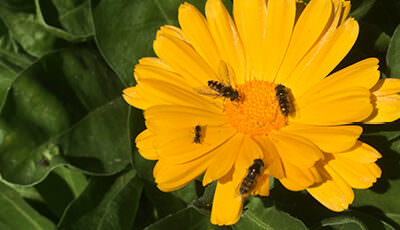
Step 1
Insects and their roles
Role-play insect pollination before heading outside.
Explain that pollination isn’t the only beneficial role that insects perform. Sometimes, insects are predators and are beneficial because they eat pest insects. When flowers attract pollinators, they can also attract predators.
We will be focusing on pollinators and predators in this activity.
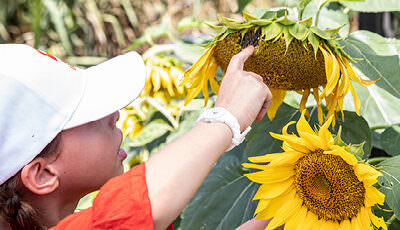
Step 2
Investigating
Using the tools and knowledge from the assessment activity, head outside.
Instead of studying the entire habitat, focus on the flowering plants.
Find some flowers (a large clump of flowers works best for this).
Practice quiet, still observation for 2 minutes, allowing the insects to go about their normal business whilst you observe.
Using the paint brushes, gently sweep insects into a container for closer observation.
Place a large sheet of white paper or fabric under some flowering plants and gently shake them. Study what falls out.
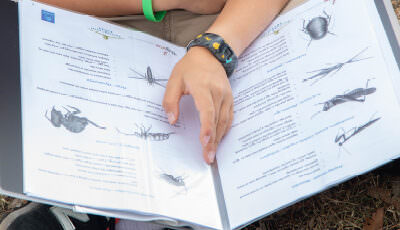
Step 3
Review
Review your results. Using your chosen field guide from the assessment activity, investigate the animals you have found.
Ask the students to observe the features of their animals and ask if they know what animals could be predators or pollinators.
Take some time to run ‘think-pair-share’, sourcing knowledge from the group. Consult your field guide for more information.
Ask the children: “Have we found any predators or pollinators that we could be a beneficial insect?”
Some common beneficial insects include:
- Bees: (native and European) Pollinators
- Ladybugs: Predators (larvae and adults) and Pollinators (adults)
- Hover flies: Predators (larvae) and Pollinators (adults)
- Mantids: Predators
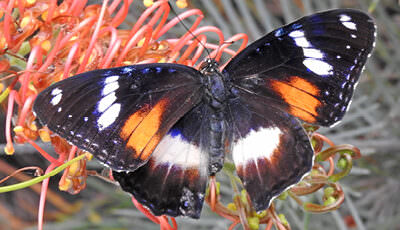
Step 4
Refine
Ask the children to develop a hypothesis (a smart guess) about why this animal was found amongst the flowers.
Select a beneficial insect and use the activity sheet to begin the beneficial insect investigation. You will be researching their features, benefits, survival needs and lifecycle and behaviours.
Either inside or in the garden, use resources (digital or printed), to research more information on the chosen animal. Complete the activity sheet.
Review the activity sheets and as a group, place the insects that were studied into a Pollinators and Predators Venn Diagram.
Share this Venn Diagram with the rest of your school.
Extension Activity
Know your enemy. Collect some stems from Aphid-affected plants in the garden (common plants that have aphids include Beets, Chard, Roses, Lettuce, Bok Choi and Beans). Put the stems in a vase to raise them inside. Monitor how their population grows and how quickly they reproduce.
Investigate the land management practices of Aboriginal and Torres Strait Islander peoples. How does sustainable management of the environment protect biodiversity?
Curriculum and Framework Links
SCIENCE
Year 2: ACSSU030, ACSHE035
Year 3: ACSSU044, ACSIS054
Year 4: ACSHE062, ACSIS064
Year 5: ACSHE083
Year 6: ACSSU094, ACSHE100
Year 7: ACSHE120
Year 8: ACSHE135
HUMANITIES AND SOCIAL SCIENCES
Year 2: ACHASSI042
Year 3: ACHASSI052, ACHASSI059, ACHASSI060
Year 4: ACHASSI080, ACHASSK088, ACHASSK090
Year 5: ACHASSI102, ACHASSK120
Year 6: ACHASSI122, ACHASSI130
DESIGN AND TECHNOLOGIES
Year 2: ACTDEK003
Year 3 & 4: ACTDEP017
Year 5 & 6: ACTDEP019
Year 7 & 8: ACTDEK032
HEALTH AND PHYSICAL EDUCATION
Year 2: ACPPS018, ACPPS022, ACPPS023
Year 3 & 4: ACPPS036, ACPPS040, ACPPS041
Year 5 & 6: ACPPS054, ACPPS059
Year 7 & 8: ACPPS073, ACPPS078
ETHICAL UNDERSTANDING
Exploring values, rights and responsibilities
PERSONAL AND SOCIAL CAPABILITY
Social awareness
CURRICULUM CONNECTIONS
Outdoor Learning
CROSS CURRICULUM PRIORITY
Sustainability
My Time, Our Place: Framework for School Age Care
Outcome 2 and 4
Reference List
ONLINE RESOURCES
Download the Gardenate app or use the Gardenate website to help determine the timing, spacing, and other compatible plants required for your climate zone.
Here is some further information from the Australian Museum about these common beneficial bugs:
- Bees (native and European)
- Ladybugs
- Hover flies
- Mantids
Consult this companion planting fact sheet on the Gardening Australia website.
Here is an interesting discussion on companion planting and biodiversity on the Sustainable Gardening Australia website.
WATCH
ABC Gardening Australia Companions in the Garden highlighting the benefits of companion planting. (6 minutes)
ACKNOWLEDGEMENT
This learning activity has been developed in partnership with the Victorian Government Department of Environment, Land, Water and Planning
IMAGE ATTRIBUTION
Feature image:
Bee collecting pollen. Photographer: David McClenaghan
Other images:
Photo of entomologist courtesy of Callum Fleming, Western Sydney University
Photos of butterflies courtesy of Malcolm Wells
Photo of hover flies courtesy of Sam Harrison
Photo of bee by Nicole Pearce on Unsplash
Photo of wasp by James Wainscoat on Unsplash
We value your feedback
When you have finished this learning activity, please tell us what you think with our survey.
Your feedback will help Landcare Australia improve the activities in the Junior Landcare Learning Centre.
Why not try one of our other Junior Landcare learning activities?
Creating a butterfly garden
Biodiversity
Love Letters to the Land
Biodiversity|First Nations Perspectives|Food Production|Waste Management
Creating a sensory garden
Biodiversity
Understanding weeds: life cycle
Biodiversity
